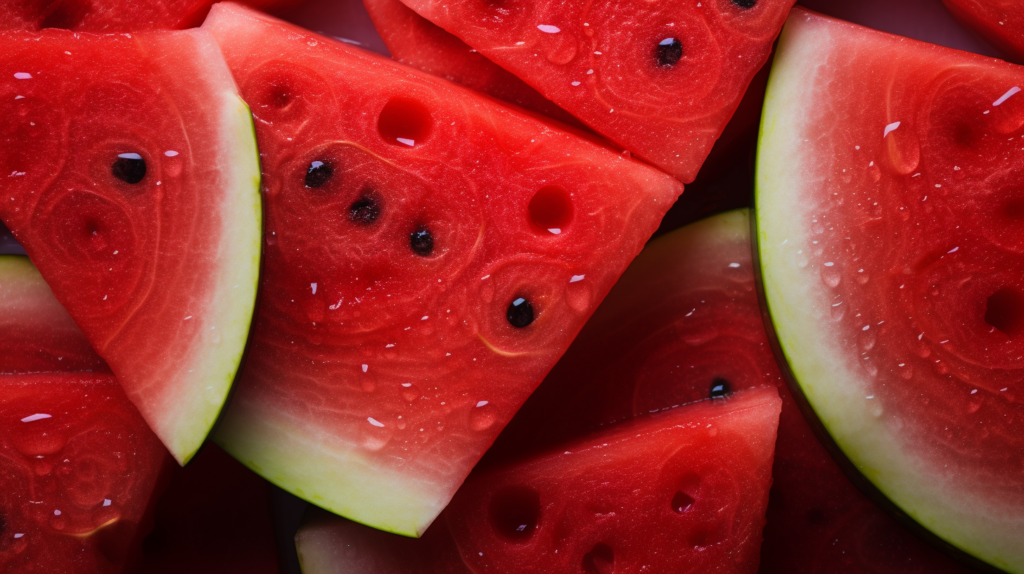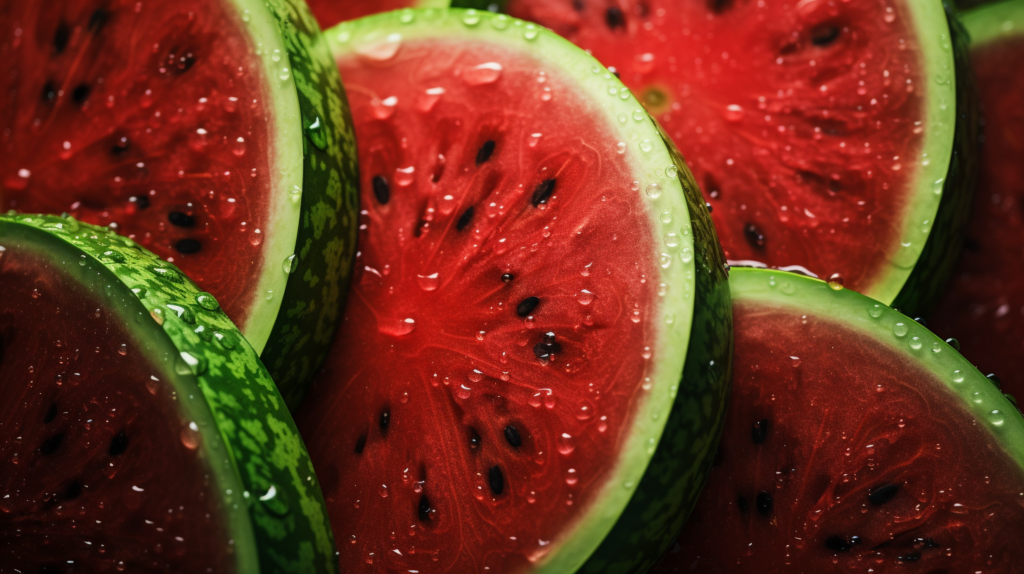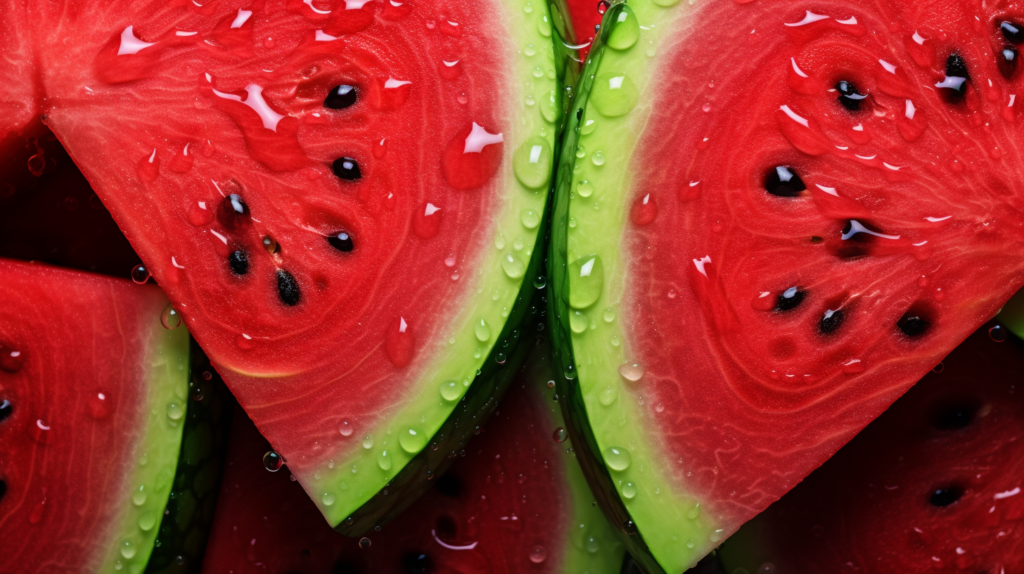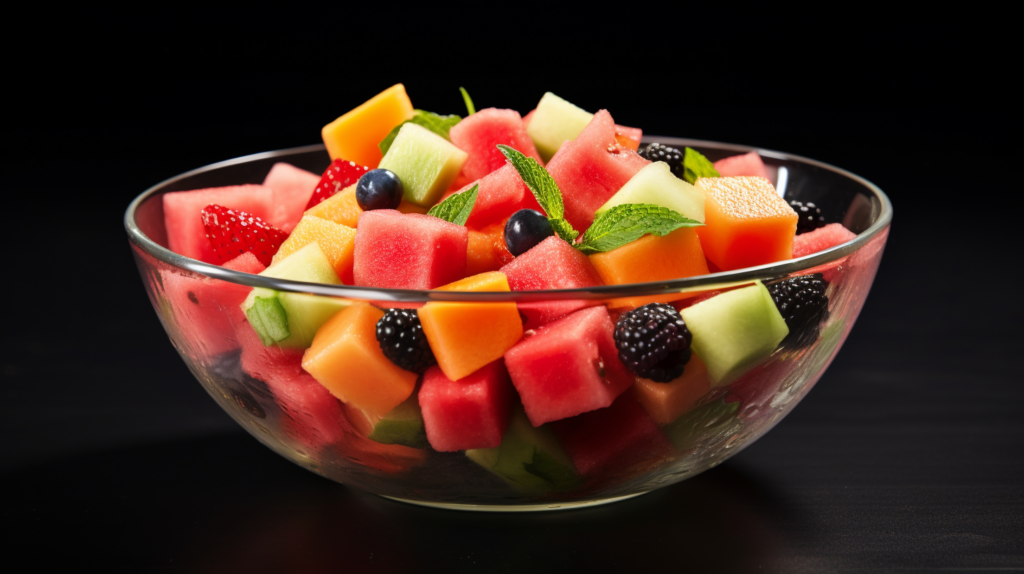Watermelon is not only a delicious fruit, but it also has amazing health benefits that you may not be aware of. One of the most impressive benefits of watermelon is its ability to naturally hydrate your body and reduce muscle soreness. If you’re looking for a refreshing and nutritious way to stay hydrated and improve your post-workout recovery, watermelon is definitely worth considering.
Principaux enseignements :
- Watermelon is a natural and nutritious way to stay hydrated.
- Watermelon can help reduce muscle soreness and aid in post-workout recovery.
- Watermelon is a delicious and refreshing superfood with numerous health benefits.
- Watermelon is a great source of vitamins, antioxidants, and other beneficial compounds.

Watermelon Hydration Benefits
Staying hydrated is crucial for maintaining good health, and watermelon is an excellent way to do so. This fruit is composed of over 90% water, making it an ideal choice for keeping you hydrated throughout the day. Eating watermelon also provides additional benefits for your hydration needs, such as:
- Replenishing electrolytes: Watermelon contains electrolytes such as potassium, which is essential for maintaining fluid balance in the body.
- Reducing fluid retention: The high water content in watermelon can help flush out excess fluid in the body, reducing bloating and swelling.
In addition to its hydration benefits, eating watermelon can also provide numerous other health benefits. This refreshing fruit is rich in vitamins and antioxidants, making it an excellent addition to your diet.
So next time you’re feeling thirsty, reach for a slice of watermelon and enjoy its delicious taste while keeping your body hydrated and healthy!

Watermelon for Muscle Soreness Relief
If you’re looking for a natural way to ease muscle soreness after a workout, watermelon is an excellent choice. This delicious fruit contains several compounds that can help reduce inflammation and speed up recovery.
One of the key components in watermelon is an amino acid called L-citrulline. When you eat watermelon, your body converts L-citrulline into another amino acid called L-arginine. This process creates nitric oxide, which is a powerful vasodilator that widens your blood vessels and improves blood flow to your muscles. By increasing blood flow, watermelon can help flush out lactic acid and other waste products from your muscles, reducing inflammation and soreness.
In addition to L-citrulline, watermelon is also high in vitamins A and C, which are important for overall muscle health and function. Vitamin A helps regulate the growth and repair of muscle tissue, while vitamin C is involved in the production of collagen, a key component of muscle fibers.
Overall, incorporating watermelon into your post-workout routine can help speed up recovery and reduce muscle soreness. Try blending watermelon into a smoothie with some protein powder for a refreshing and nutrient-packed recovery drink.

Nutritional Value of Watermelon
Watermelon is not only delicious but also a highly nutritious fruit that provides numerous health benefits. It is an excellent source of vitamins, minerals, and antioxidants, making it a perfect addition to your diet. Here are some of the key nutritional benefits of watermelon:
| Nutriments | Quantité par 100g | % Valeur quotidienne* |
|---|---|---|
| Calories | 30 | 1.5% |
| Protéines | 0.6g | 1% |
| Gras | 0.2g | 0.3% |
| Glucides | 7.6g | 2.5% |
| Fibre | 0.4g | 1.5% |
| Sugar | 6.2g | N/A |
| Vitamine C | 8.1mg | 9% |
| Vitamine A | 28mcg | 3% |
| Potassium | 112mg | 2% |
Watermelon is particularly high in vitamin C, which is essential for a healthy immune system and skin. It is also a good source of vitamin A, which is important for eye health. Additionally, watermelon contains potassium, which helps to regulate blood pressure and supports proper muscle and nerve function.
Moreover, watermelon is a rich source of antioxidants, including lycopene and beta-carotene. Lycopene is known for its potential to reduce the risk of heart disease and certain types of cancer, while beta-carotene has been linked to a reduced risk of age-related macular degeneration (AMD).
Overall, with its low calorie count, high water content, and abundance of vitamins and antioxidants, watermelon is a nutrient-packed fruit that should be a staple in any healthy diet.
Watermelon for Weight Loss
If you’re looking to shed a few pounds, eating watermelon can be a great addition to your weight loss efforts. Not only is watermelon low in calories, but it’s also high in water content, making it a great choice for those looking to feel full without consuming excessive calories.
But that’s not all – watermelon also contains a compound called citrulline, which helps to reduce the accumulation of fat in the body. Additionally, the high fiber content in watermelon can help to keep you feeling full for longer periods of time, reducing the likelihood of overeating or snacking on unhealthy foods.
Furthermore, research has suggested that consuming watermelon can help to curb cravings for sugary and high-fat foods, making it a great addition to your weight loss diet. So, if you’re looking to drop a few pounds, consider adding more watermelon to your daily meals and snacks.

Watermelon for Skin Health
If you’re looking for a natural way to improve your skin health, watermelon may be just what you need. The high water content and essential nutrients found in watermelon can help keep your skin hydrated and nourished, giving it a healthy and youthful glow.
One of the key nutrients found in watermelon is vitamin C, which plays a vital role in collagen production. Collagen is a protein that gives your skin its structure and elasticity, and as we age, our bodies produce less of it. Eating watermelon can help boost your body’s collagen production, leading to smoother and more supple skin.
In addition to vitamin C, watermelon also contains lycopene, a powerful antioxidant that helps protect your skin from damage caused by UV rays and other environmental factors. Studies have shown that lycopene can help reduce the risk of skin cancer and other skin conditions.
The high water content of watermelon also makes it a great choice for hydrating your skin from the inside out. When you’re dehydrated, your skin can become dry and dull, but drinking watermelon juice or eating watermelon can help keep your skin hydrated and looking its best.
Incorporating watermelon into your diet can also help reduce inflammation, which is often a cause of skin irritation and redness. Watermelon contains compounds like cucurbitacin E and flavonoids, which have been shown to have anti-inflammatory properties.
Overall, there are many benefits to eating watermelon for your skin health. Whether you’re looking to reduce the signs of aging, protect your skin from damage, or simply keep it hydrated and healthy, watermelon is a delicious and nutritious way to support your skin from the inside out.

Watermelon for Heart Health
You may be surprised to learn that watermelon is not only refreshing but also good for your heart. Watermelon contains a variety of heart-healthy compounds that can help to lower your risk of heart disease.
One of the key compounds found in watermelon is lycopene, an antioxidant that has been linked to a reduced risk of heart disease. Lycopene helps to protect your heart by reducing inflammation, improving blood vessel function, and lowering cholesterol levels.
Watermelon is also a good source of vitamins A and C, which both have antioxidant properties that can help to protect your heart against damage from free radicals. In addition, the potassium found in watermelon can help to regulate blood pressure and reduce your risk of stroke.
So, next time you’re looking for a healthy snack to satisfy your sweet tooth, consider reaching for a slice of watermelon. Not only will it hydrate you, but it may also help to keep your heart healthy.

Watermelon for Digestion
Watermelon is not just a refreshing and delicious fruit, but it can also contribute to healthy digestion. This is thanks to the fiber content found in watermelon, which can help regulate bowel movements and prevent constipation. Eating watermelon regularly can also help promote the growth of healthy gut bacteria, leading to better overall digestive health.
In addition to its fiber content, watermelon also contains high levels of water. Staying hydrated is important for maintaining digestive health, as it helps keep food moving smoothly through the digestive system. Drinking watermelon juice or eating watermelon can therefore be a great way to stay hydrated and maintain good digestion.
Watermelon also contains the amino acid citrulline, which can help to relax blood vessels and improve blood flow to the digestive system. This can aid in the digestion process, helping to reduce bloating and discomfort after meals.
To get the most digestive benefits from watermelon, it is best to consume it on an empty stomach. Try starting your day with a refreshing watermelon smoothie or adding some chunks of watermelon to your morning yogurt.

Conclusion
Watermelon is more than just a refreshing summer treat. It is a nutritional powerhouse that offers a host of health benefits. By consuming watermelon regularly, you can naturally hydrate your body, reduce muscle soreness, support weight loss, promote healthy digestion, and nourish your skin and heart.
The Importance of Eating Watermelon
Incorporating watermelon into your diet can have a significant impact on your overall health and wellbeing. By enjoying this delicious fruit, you can take advantage of its many health benefits and boost your body’s essential nutrients.
Whether you’re looking to stay hydrated during the hot summer months, reduce muscle soreness after a workout, or support your heart and digestive health, watermelon is an excellent choice. So the next time you’re looking for a healthy and refreshing snack, reach for a slice of juicy, delicious watermelon and enjoy all the benefits it has to offer.
So what are you waiting for? Start incorporating watermelon into your diet today and experience all the amazing health benefits that this superfood has to offer. Your body will thank you!
FAQ
Q: What are the health benefits of watermelon?
A: Watermelon offers numerous health benefits, including natural hydration and reducing muscle soreness.
Q: How does watermelon naturally hydrate the body?
A: Watermelon has a high water content, helping to replenish fluids and keep you hydrated.
Q: Can watermelon help reduce muscle soreness?
A: Yes, watermelon contains an amino acid called L-citrulline, which can help reduce muscle soreness and aid in post-workout recovery.
Q: What is the nutritional value of watermelon?
A: Watermelon is a rich source of vitamins, antioxidants, and other beneficial compounds that contribute to overall health.
Q: Is watermelon beneficial for weight loss?
A: Yes, watermelon is low in calories and high in water content, making it a great choice for weight loss and helping to curb cravings.
Q: Can watermelon improve skin health?
A: Watermelon’s hydrating properties can contribute to healthy skin, promoting a youthful complexion.
Q: How does watermelon support heart health?
A: Watermelon contains high levels of lycopene and other heart-healthy compounds, which can help support cardiovascular health.
Q: Does watermelon aid in digestion?
A: Yes, watermelon is a good source of fiber, which aids in digestion and helps prevent digestive issues.














